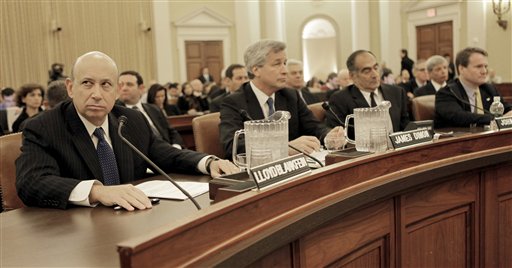If you googled the words “goldman sachs sec” on Monday, April 19, you could see, near the very top of the page, just below a link to the official Goldman Sachs website, a sponsored link directing interested parties to www.barackobama.com, where you were encouraged to sign your name to a “Help Change Wall Street” petition.
A spokesman for the SEC is denying that the commission coordinated its decision with the White House or Democratic legislators. But that hasn’t dissuaded suspicious opponents of banking reform from taking Goldman’s side and assuming that the accusations are just a “prop” in the administration’s campaign, as Politico reports. Nor, as the quick move to grab the goldman sachs sec keywords proves, have proponents of reform been slow to capitalize on the drama transfixing Wall Street.
Securities fraud charges against the world’s premier investment bank are not undertaken lightly. Despite the propitious timing, this case has been in the works for years. The SEC was first alerted to potential improprieties with respect to the Abacus CDO in August 2008. Goldman responded in depth to the SEC’s “Well Notice” informing it of a possible enforcement action all the way back in September.
In fact, one of the subthemes of the Goldman debate raging across the Web on Monday was whether the investment bank was guilty of misleading its own shareholders by not revealing to investors in regulatory filings that an investigation might be pending. Footnoted’s Michelle Leder breaks it down and suggests that other banks in similar situations have been quick to declare the existence of a potentially hostile SEC. Given the market’s reaction to the news — Goldman’s stock fell by 13 percent on Friday — the SEC’s interest in the deal certainly seems like something investors might have wanted to know about.
It will be weeks before we know what impact the fraud charges will have on banking reform and possibly years before we get a guilty or innocent verdict on Goldman (if the bank backs up its current tough talk and refuses to settle). But there’s one thing that we do know right now — at least one government regulatory body seems intent on actually regulating. We shouldn’t underestimate the significance of this development.
In an appearance on “This Week” on Sunday, Bill Clinton made news by saying that Larry Summers and Robert Rubin had given him the wrong advice on derivatives. But he also said that, irrespective of whether or not the right regulations were in place, the will to regulate was also critical to ensuring smoothly functioning markets.
Clinton also said the Bush administration contributed to the financial crisis with lax regulation.
“I think what happened was the SEC and the whole regulatory apparatus after I left office was just let go,” Clinton said. If Clinton’s head of the Securities and Exchange Commission, Arthur Levitt, had remained in that job, “an enormous percentage of what we’ve been through in the last eight or nine years would not have happened,” Clinton said. “I feel very strongly about it. I think it’s important to have vigorous oversight.”
Clinton’s position is extraordinarily self-serving, especially given the overall deregulatory impulses that governed his own economy policy. But there’s the nub of a very important point here. A recurring theme in current discussions of regulation has been the observation that all the best rules in the world are worth nothing if regulators don’t exercise their authority to oversee markets. The Goldman case is a classic example. If Goldman did what the SEC is accusing it of having done, those actions are illegal under current law. We don’t need banking reform to make such behavior is out of bounds. Political considerations aside, most independent observers looking at the facts, as laid out in the SEC’s complaint, agree: Potential investors in the Abacus CDO would undoubtedly have considered the fact that the underlying securities in the portfolio had been specifically chosen by another investor who was betting against them (i.e., that they would default) to be “material,” that is, something that they would want to know. Goldman is swearing up and down that everybody involved was a “sophisticated investor,” well, let the buyer beware. But that argument, while potentially legally defensible, is highly unlikely to assuage any future clients of Goldman who might be wondering just whose interests the investment bank is serving in any given deal. Steve Waldman has a terrific post at Interfluidity highlighting the essence of the problem.
Of course, the contemporary regulatory climate in 2007 gave Goldman every incentive to play fast and loose. Since at least 1980, the dominant ethos governing relations between Washington and Wall Street has been to let the market govern itself. No matter what laws are on the books, if regulators don’t even believe in their own purpose for existence, financial institutions will inevitably act in ever more reckless and greedy ways.
Defenders of Goldman Sachs have seized upon the news that SEC commissioners split along party lines when voting, 3-2, to sue Goldman for securities fraud, as further evidence that the case was politically motivated. But one could also take the split vote as proof that Republicans still don’t have a clue how disastrous their laissez-faire ideology has been for the financial health of the nation.
We’re not going to fix our problems, once and for all, with any form of politically feasible banking reform. But if regulators get the message from the White House that their job is to regulate and Wall Street starts looking over its shoulder wondering whether a wrathful SEC is looking for excuses to bring the hammer down, then maybe, just maybe, our fortunes will improve.


